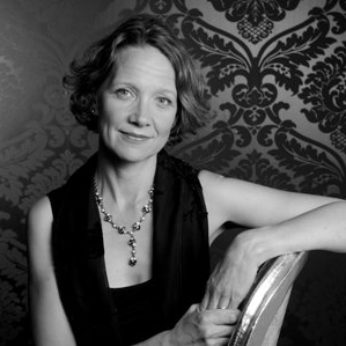Composer: Olivier Messiaen (b. 1908 - d. 1992)
Performance date: 30/06/2013
Venue: St. Brendan’s Church
Composition Year: 1936
Duration: 00:26:18
Recording Engineer: Damian Chennells, RTÉ lyric fm
Instrumentation: S-solo, pf
Instrumentation Category:Duo
Artists:
Julius Drake -
[piano]
Deborah York -
[soprano]

Messiaen
wrote this work, his first major song-cycle, in 1936 and dedicated it to his
first wife, the violinist Claire Delbos, whose pet name was Mi. There are two
books, the first comprising four songs, the second a further five, the total
nine being symbolic of maternity. He
wrote his own texts, reflecting his deeply committed Roman Catholic faith,
somewhat unfashionable today perhaps but an essential component of the
composer’s fundamentalist theology. The first book relates to the preparation
for marriage and the second considers its spiritual side and eternity. He
orchestrated the cycle the following year. There are no time signatures or bar
lines in the score, leaving the performers the freedom to phrase the music to
suit the words, almost like plainsong.
The accompaniments are sparse, either simple sinuous lines or
dramatically chordal, while the vocal style is declamatory
The
cycle opens quietly with Action de graces, the
longest of the songs, as he praises Mi and how she has given him grace, ending
with an ecstatic, extended Alleluia. The plainsong aspect is clear throughout
the sinuous lines. The second song Paysage is also meditative, as he
calls up the image of her smile somewhere between
the corn and the sun, both music and words suffused with colour. La maison, alarmingly for what is after
all a series of love songs, speaks of leaving the house of life for an eternal
and luminous Truth. The First Book concludes with Épouvante – a
spectacular vocal display describing in vivid detail the terrors of Hell,
another unusual topic for a love song.
The second book opens with L’épouse
and the injunction to go whither
the Spirit lead you, followed by Church teaching on the sanctity of
marriage, the beauty of the music rising high above the traditional texts. The
sixth Ta voix continues this strange
contrasting of deeply personal evocations of the beloved contrasted with
theological advice on how to join the choir of incorporeal angels, not exactly the Song of Songs. This poem includes one of Messiaen’s early versions
of his famous stylised birdsong that concluded with his gigantic piano cycle Catalogue des Oiseaux. The dramatic Les deux guerriers follows, in which
husband and wife must join forces to defeat the powers of evil. The eighth
song, Le collier, is a vision of
fulfilment in earthly love, its more poetic imagery inspired by the idea of his
lover’s arms as a necklace in the morning; the music is quiet and introspective
apart from the repeated cries Ah! Mon
collier! This leads to the joyous bell-like accompaniment of the finale,
the singer returning to the rapid delivery of the text like an intoned psalm as
in the opening poem with key words decorated by long melismas, most especially in
the final La joie.
Copyright © 2024 West Cork Music. All rights reserved.
Designed and developed by Matrix Internet